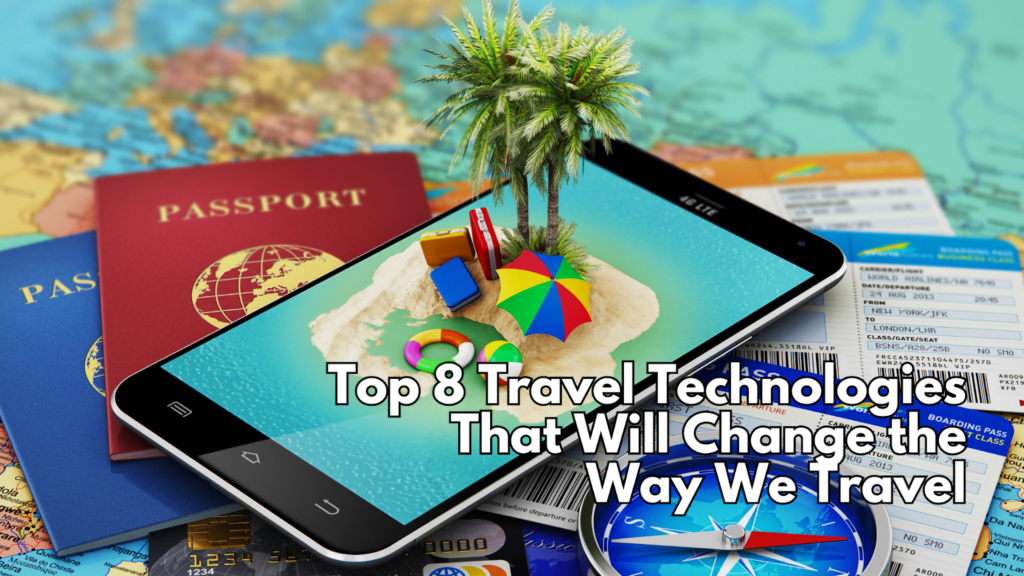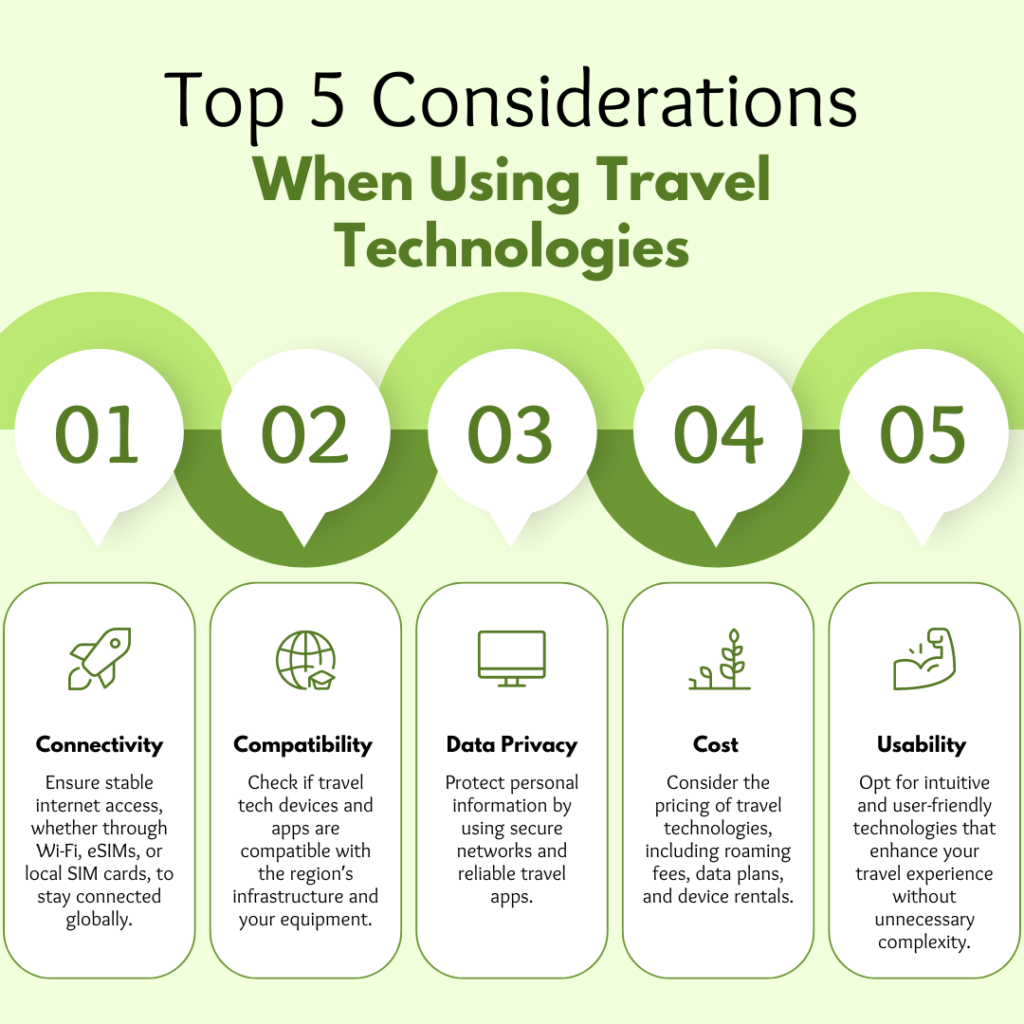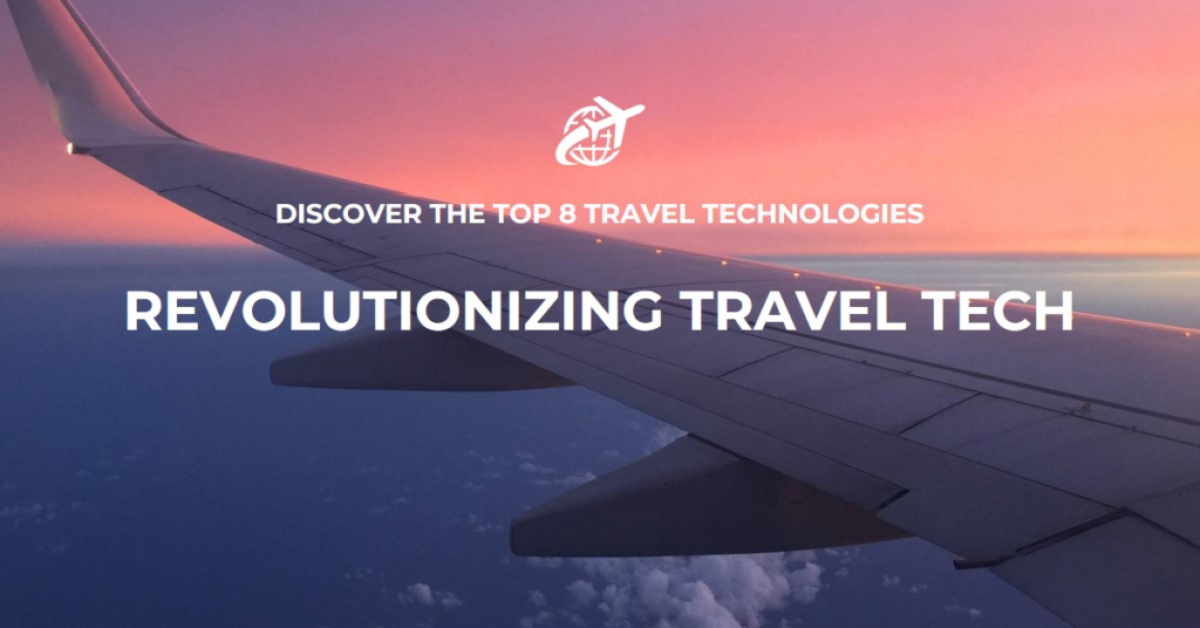Top 8 Travel Technologies That Will Change the Way We Travel
Travel and technology go hand in hand in this fast world of ours. Be it the reservation for our flights or navigating a new city, travel technologies has changed how we travel. Convenience, efficiency, and enjoyment are the innovations for every adventurer and business person today in travel. With various digital platforms and connectivity enhancement, travelers have much more control over his or her trip than ever before. Whether you are embarking on a long business trip or a months-long adventure, these travel technological advances will change the way you travel through the world.

Here we give our readers eight of the best travel technologies that are shaping the way we travel and what’s coming along in due course soon. With these game-changing tools and systems, you are assured of having traveled as smoothly, safely, and custom-specific experiences as possible.
1. Maintaining Connections Using Embedded Sims
With the advent of eSIM technology, travelers can now go without the hassle of having to share one’s SIM card or sharing international roaming plans as it would add a strain on the pocket. It has always been a requirement while traveling from one country to another, especially in Europe, to share one’s SIM card or option international roaming plans. Using e sim uk, travelers can switch seamlessly between mobile networks without changing physical SIM cards thus keeping them connected anywhere in the world.
ESims are small non-removable chips in the device through which users can activate and change their mobile plans with next to no difficulty – and entirely from a distance. This is a very helpful innovation for people traveling across different countries. To use their smartphones, a traveler going through the UK would be able to change networks based on location and data needs. The technological factor to consider here is that with such technology, tourists and business travelers are plugged into the world without the hassle and cost implied in buying a new SIM card in every country they go to.
2. Artificial Intelligence in Travel Booking
With the help of AI, booking has become much easier as the algorithm considers tons of data to provide personal recommendations. Travel assistants and even chatbots, now based on AI, can assist in guiding travelers to find the best fights, accommodations, and other activities according to their preferences. Intelligent tools can compare prices and predict price fluctuations, thus suggesting the best option for your budget.
Artificial intelligence also makes the service of customers more efficient. After a problem or issue arises for a traveler, AI chatbots are there to answer that with instant solutions day and night, which creates a smoother and stress-free experience for everyone throughout the journey.
3. Biometric Security and Boarding
Airport lines are the worst nightmare for travelers; however, biometric security technology is reshaping this reality. They use facial recognition, fingerprint scanning, and even iris scans at security checkpoints and boarding gates to try to increase speed.
Biometric data allows passengers to clear the security points much more quickly without requiring passengers to produce identification multiple times. Most of the leading international airports and airlines are adopting biometric systems in the processes of check-in and boarding, which makes it expedient and secure. This also reduces the scope of possibilities for human mistakes and expedites the journey process as a whole.

4. Contactless Payments
Today, contactless payments are more ordinary practices not only for local transactions but also for travelers worldwide. Contactless payment systems such as Apple Pay, Google Wallet, and tap-to-pay credit cards prevent foreign travel from involving unnecessarily big changes or handing over cash on the road since it can all be expedited quite easily with these types of payment options.
These travel technologies are particularly advantageous in countries where card transactions would be preferable to cash and ensure you do not have to carry large amounts of local currency. And also more secured transactions which minimize the risk of theft and fraud.
5. Augmented Reality (AR) Travel Apps
Next in travel technologies, augmented reality has been used in interesting travel manners. With AR, experiences have been made interactive to make the journeys of travelers a lot better. AR applications for traveling can superimpose needed information on the screen of the smartphone. These might give either directions or translations and even particular historical facts about landmarks.
Imagine walking through a historic site and using your smartphone to see the digital reconstruction of how the area must have looked centuries ago. Or pointing your device at a street sign to receive an instant translation in a native language. This immersive experience is going to enable travelers to connect with their destinations in new, more meaningful ways.
6. Digital Health Passports
In a post-pandemic world, health security is growing in importance for most travelers. The biggest tools so far in making international travel safe have been digital health passports storing vaccination records and test results. Digital health documents are secured on smartphones and become easier to present for health credentials, rather than the piece of paper previously attached when required by airlines or other border officials.
Such health passports make entry processes more efficient and reduce border-related delays, especially in places that demand particular health clearances before entry. As international restrictions and requirements continue to change, the digital health passport will remain a fundamental form of travel technology.
7. Virtual and Remote Experiences
With the reality of virtual travel, it is now possible to explore destinations and experience tourist attractions from the comfort of one’s own home. Travelers can take virtual tours of museums, national parks, and even cities around the world, previewing what they are getting themselves into.
For those who cannot travel because of restrictive regulations or health issues, VR comes in handy. This technology also presents opportunities to travel agencies and destination marketers in the marketing and promotion of their offerings to travelers, thus making it easier for travelers to make better choices.
8. Smart Luggage
Smart luggage has revolutionized how travelers manage their belongings. These high-tech suitcases come equipped with GPS tracking, USB charging ports, and digital scales to prevent overpacking. Some smart luggage even has self-driving capabilities, making it easier for travelers to navigate airports and train stations without carrying heavy bags.
The GPS tracking feature offers peace of mind, especially for frequent travelers, by helping them locate their luggage in case it gets lost. The integration of battery packs and charging ports ensures that travelers are always able to keep their devices powered up, even during long layovers for flights.
Keeping Travel Safe with Digital Solutions
With the development and diversification of these new travel technologies, safety is at the very top of the concerns of both travelers and service providers. Biometric security systems and digital health passports minimize the risks related to moving through airports and borders, and contactless payments and AR apps make tourism more practical. More and more countries’ adoption of these travel technologies will make traveling safer and more convenient for tourists.
Conclusion
The infusion of technology into travel has made it easier than ever before for people to plan, execute, and enjoy trips around the world. Whether it is new booking systems, enhanced safety features, or more innovative connections like eSIM UK, today’s traveler has the means to make his travel experience seamless and enjoyable. New technologies promise the process will become easier, safer, and fit for individual needs as travel evolves. Embracing these advancements enables us to travel smarter, safer, and more flexibly, thereby substantially enhancing the overall travel experience.
FAQs
1. What is an eSIM? How does it differ from a traditional SIM card?
An eSIM is an embedded SIM card that you can change carriers and activate mobile plans digitally, in contrast to the traditional SIM card, which requires a physical change.
2. Does smart luggage work with every airline?
Most of the smart luggage can be used by all the airlines. It depends on the airline too, whether they use any lithium-ion battery or not, and especially to remove it before boarding the airplane.
3. How are biometric systems improving airport security?
Biometric systems in travel technologies that include facial recognition and fingerprint scanning provide proper identification of passengers as early as at the check-in counter as well as the boarding while upgrading the time that check-in and boarding take.


